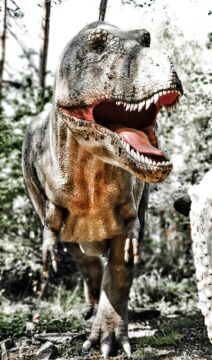by Jochen Szangolies

Humans, Plato famously held, are featherless bipeds: uniquely singled out from other animals by walking permanently on two legs, which delineates us against fish, mammals, and reptiles, while not sporting the sort of plumage associated with birds. Of course, he knew little of the mighty T. Rex (although its featherlessness is subject to recent academic dispute), and Diogenes the Cynic quickly came up with a deflationary argument: he crashed Plato’s school, brandishing a plucked chicken.
Plato was engaged in a project that goes on to this very day: the definition of what, exactly, is it that makes humans human—how we are distinguished from all else that creeps and crawls on the face of the Earth (and presumably, beyond). However, as performatively illustrated by Diogenes, such an endeavor is intrinsically fraught: defining the human is not just a matter of practicality, but what—or who—counts as human impinges on questions of moral standing, of whether to extend certain rights and protections. A standard human, if such a thing existed, would be a norm against which all are compared, and either permitted to enter ‘club human’ or not.
Even this is a simplification, however. The line, here, is not as clear as ‘human’ and ‘not human’—frequently, in the history of humanity, we encounter various categories of ‘human, but’: people that count as human, but not as the special sort of human, the ‘standard human’ that forms the measure of what it means to be truly worthy of all the rights and protections that society affords its most highly valued members.
This too is exemplified in the story of Plato’s featherless biped: what he was trying to define was man, not human. While we might count this as a quirk of a bygone time, or of the ancient Greek language, this attitude is pervasive throughout history, and finds its echo both in overt ostracism of ‘nonstandard humans’ and in subtle slanting of the playing field against those that don’t quite measure up. Read more »
